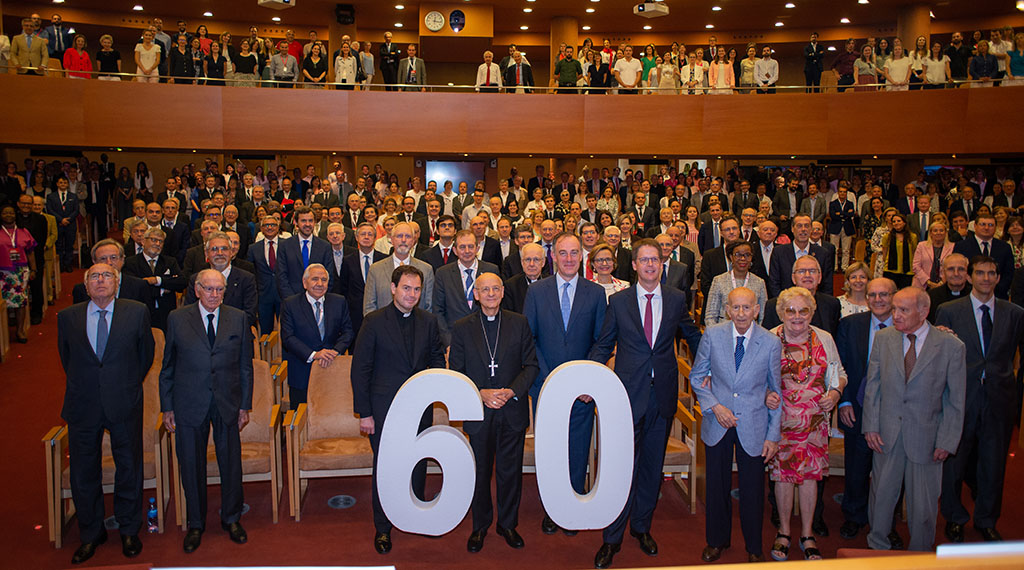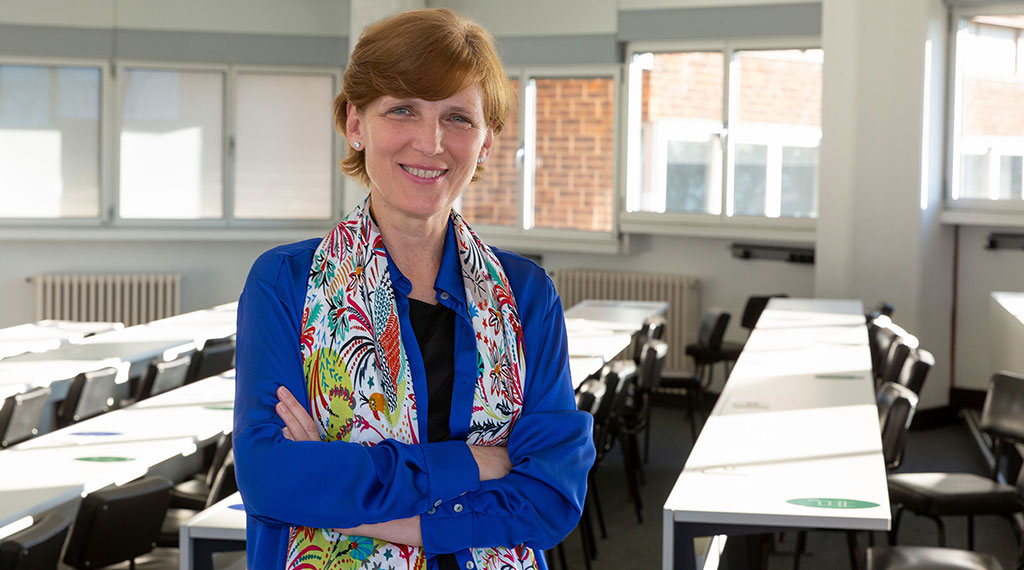Stories
“Business is a great transformer of people”
University of Navarra Grand Chancellor, Monsignor Fernando Ocáriz, visits IESE for 60th anniversary
The Grand Chancellor of the University of Navarra, Monsignor Fernando Ocáriz (center), visited IESE to mark its 60th anniversary.
Photo: Edu Ferrer
July 5, 2019

“Business is a community of people that serves other people within a society of people. Only after taking this into consideration do capital, facilities, technology and legal realities come into play,” said the Grand Chancellor of the University of Navarra, Monsignor Fernando Ocáriz, in a visit to IESE.
Ocáriz inaugurated a conference focused on business and social responsibility to mark IESE’s 60th anniversary. Directed by professor Antonio Argandoña, the conference will explore the purpose of management and companies at a time of great economic, social and technological change. And it will examine the role of business schools in this context.
In addition to Ocáriz, the event counts on the participation of 16 associated schools of IESE, and features speakers from other universities, such as Robert G. Kennedy (University of St. Thomas), Martin Rhonheimer (Universidad Pontificia de la Santa Cruz), João Luis César das Neves (Universidad Católica de Lisboa), Enase Okonedo (Lagos Business School) and Juan Manuel Elegido (Pan-Atlantic University).
Business, a positive reality
In his speech, Ocáriz reflected on what we understand today by business, linking organizations not only with financial results but also with the fundamental values of our society.
Business today has a poor reputation and media reminds us constantly of its “excessive concern for financial results, of jobs lacking in humanity, of schedules incompatible with family life.” For Ocáriz, “There are, obviously, reasons for this pessimistic view, but that is not the last word.”
“If business is a community of people, it is not valid to judge it only on one aspect of its results. People have to be the protagonists and beneficiaries of the actions taking place in organizations. It is legitimate to try to achieve good returns on capital, but always avoiding the temptation to seek money, power and personal success above all else,” he added.
The meaning of work
Contemplating the importance of work for human development, Ocáriz suggested that more important than results was individual change: “Business is, undoubtedly, a great transformer of people and an expression of their freedom, which is a fundamental value and an inalienable right that must be promoted and protected. It is an expression of the sociability of the person that needs relations with others to meet their material and spiritual needs, to give meaning to their work, to render a service to others, to know themselves and to achieve fulfilment.”
“In our jobs, every day there is a continual exchange of benefits. We receive a lot, not just a salary, but also knowledge, abilities, relationships and friendships. At the same time, we give a lot: time, effort, care, enthusiasm, knowledge, experience… We give everything to the company, to our families and society in general and we receive from all of these. Thus even the most selfish, who perhaps envisaged their job exclusively as a means to satisfy their personal interests, end up serving.”
The role of managers is key to making possible this humanistic vision of the company and work. “What is the primary task of an executive? To convene, train, guide, demand, encourage, nurture and, occasionally, heal the human team that will carry out the company’s activities,” he said..
Along those lines, he also remembered the words of Josemaria Escrivá de Balaguer, founder of the University of Navarra, who in his visit to IESE in 1972 said “the first virtue that an executive must possess is charity, because justice alone is not enough.”
60 years leaving a mark on people
Ocáriz noted that from its founding in 1958, IESE has had a holistic approach to business. “From the outset, IESE understood business not just as capital trying to create a return, nor as facilities that provide people with employment, nor even as a project rendering services for consumers and workers, but above all as a community of people”, he recognized.
“Since that first management training program that began in November 1958, IESE has undergone notable changes that have translated into improved professional and personal results for the thousands of men and women that have benefitted from the mark left on society by IESE,” he commented.
He concluded with a look to the future: “Much remains to be done: new generations reach your classrooms every day, your programs multiply, you are present in ever more countries, your research work receives well-deserved praise… But what distinguishes IESE is this constant reference to moral and ethical values. Always be faithful to this.”
